Online learning platforms for K-12—also known as virtual schools—are changing the way kids learn, offering a convenient and flexible alternative to traditional classrooms. These platforms bring everything your student needs to learn right into your living room (or wherever you have Wi-Fi!). Whether your kid is homeschooled, needs some extra help, or you’re just curious about the future of education, this article is your roadmap to discovering the awesome world of online learning.
Get ready to explore the top platforms, learn how to pick the perfect one for your child, and discover tips for making the most of this digital adventure. We’ll cover everything from flexible scheduling and personalized learning plans to virtual field trips and interactive lessons.
The Advantages of Online Learning Platforms for K-12

Online learning platforms for K-12 aren’t just a trend; they’re a game-changer for education. Let’s take a closer look at the compelling benefits they offer:
- Flexibility and Convenience: Virtual schools put education on your terms. Students can learn at their own pace, whether it’s early in the morning, late at night, or during a weekend road trip. This flexibility is a lifesaver for busy families, athletes, performers, or anyone seeking a personalized learning experience.
- Personalized Learning: Forget one-size-fits-all education. Online learning platforms use intelligent algorithms and adaptive learning technology to tailor lessons to each student’s strengths, weaknesses, and learning styles. This means students receive targeted instruction, making learning more efficient and enjoyable.
- Diverse Course Offerings: From core subjects like math and science to niche interests like coding or Mandarin, online learning platforms for K-12 offers a buffet of courses that may not be available in traditional schools. This allows students to explore their passions, discover new talents, and even earn college credit in high school.
- Global Connections: The world becomes the classroom with online learning. Students can virtually explore historical landmarks, interact with experts from different fields, and collaborate on projects with peers from across the globe. This global perspective fosters cross-cultural understanding and prepares students for an interconnected world.
- Accessibility and Inclusivity: Online learning platforms for K-12 can be a lifeline for students with special needs, health issues, or learning disabilities. They offer adaptive tools, assistive technology, and personalized support to ensure all students have equal access to quality education.
Choosing the Right Online Learning Platform for Your K-12 Child

With so many online learning platforms for K-12 available, finding the perfect fit can feel like searching for a needle in a haystack. But don’t worry, we’ve got your back! Here are the key factors to consider when making this important decision:
- Accreditation: Ensure the platform is accredited by a recognized agency. This ensures that the curriculum meets high standards and that your child’s credits will be transferable to other schools or colleges.
- Curriculum Quality: Does the curriculum align with your state’s educational standards? Is it engaging, rigorous, and up-to-date? Look for platforms that offer a variety of subjects and learning materials, including interactive lessons, videos, simulations, and projects.
- Teaching Methods: Some platforms offer live classes with real teachers, while others rely on self-paced modules and recorded lessons. Consider your child’s learning style and preferences when choosing a platform. Do they thrive in a structured, teacher-led environment or prefer to learn independently at their own pace?
- Technology Requirements: Check if the platform is compatible with your devices and internet connection. Some platforms require specific software or hardware, while others are accessible from any web browser. Make sure you have the necessary equipment and a reliable internet connection to ensure a smooth learning experience.
- Pricing: Online learning platforms for K-12 vary in price, from free options to those with monthly or annual subscriptions. Consider your budget and what you’re willing to invest in your child’s education. Some platforms offer free trials or financial aid options, so don’t hesitate to inquire.
- Age and Grade-Level Considerations: Different platforms cater to specific age groups and grade levels. Look for platforms that offer age-appropriate content, activities, and social interaction opportunities. Some platforms even specialize in certain subjects or learning styles, so consider your child’s interests and needs.
- Customization and Support: Does the platform offer personalized learning plans, progress tracking, and regular feedback? Is there readily available teacher or tutor support for when your child needs help? A supportive learning environment is crucial for success.
- Additional Features: Many platforms offer extra features like virtual field trips, extracurricular clubs, and college counseling. These can enhance your child’s learning experience and provide opportunities for social interaction and personal growth.
By carefully considering these factors, you can find an online learning platform for K-12 that empowers your child to reach their full potential. Remember, the best platform is the one that aligns with your child’s individual needs, interests, and learning style.
Top Online Learning Platforms for K-12
If you’re in the U.S. and exploring online learning for your child, you’re in luck! There’s a whole world of virtual schools, flexible programs, and helpful resources ready to supercharge your child’s education.
Best Public Virtual School Options (Tuition-Free)
K12: Your Online Public School Option
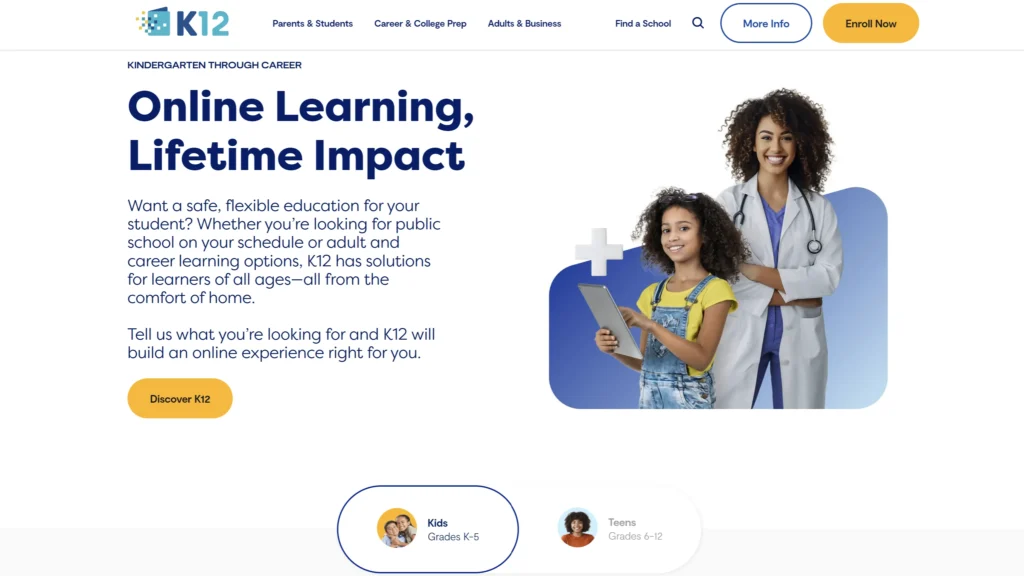
Photo credit: k12.com
Think of K12 as your neighborhood public school but without the brick-and-mortar building. It’s a fully accredited, tuition-free online public school option that’s available in many states across the U.S. This means it follows the same curriculum standards as your local schools, but everything happens online – classes, assignments, even quizzes and tests.
Features
- Live Classes & Real Teachers: Your child will have live classes with state-certified teachers, just like in a regular classroom. They can ask questions, participate in discussions, and get feedback in real-time.
- Structured Curriculum: K12 follows your state’s curriculum, so your child will be learning the same things as their peers in brick-and-mortar schools.
- Support System: K12 doesn’t just leave you to figure things out on your own. They have academic advisors, counselors, and tech support to help your child succeed.
- Extracurriculars: Even though it’s online, K12 offers clubs and activities to keep your child engaged and connected with their peers.
- Variety of Programs: Depending on your state, you might have different K12 options to choose from. Some states have full-time online public schools through K12, while others offer individual courses or programs.
Considerations
- State Availability: K12 is available in many states, but not all. Check their website to see if it’s an option where you live.
- Enrollment Requirements: Since it’s a public school, there might be enrollment requirements and deadlines.
- Live Class Schedule: While there’s flexibility, your child will still need to attend live classes at scheduled times.
K12 provides all the necessary software and tools for learning. The platform is pretty user-friendly, and they offer tech support if you run into any issues.
If you’re looking for a public school experience with the added convenience of online learning, K12 might be the perfect fit.
Connections Academy: Online Public School with a Personal Touch
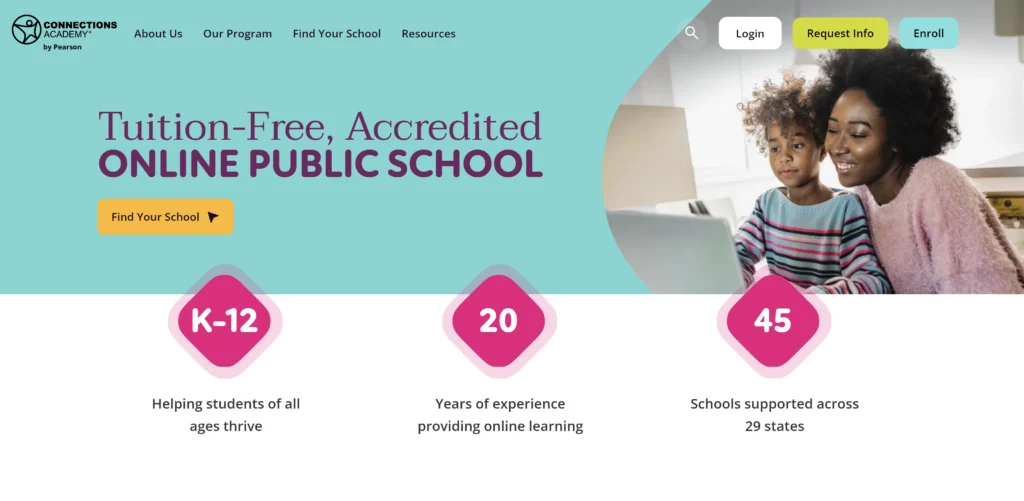
Photo credit: connectionsacademy.com
If you like the idea of public school but want something a little more personalized, Connections Academy is an excellent public virtual school option. Just like K12, it’s a fully accredited, tuition-free online public school, but it puts a big emphasis on tailoring the experience to your child’s needs.
What Sets Connections Academy Apart
- Live Classes & Teachers Who Care: Your child will have live classes with real, certified teachers who are trained to teach online.
- Personalized Learning Plans: Connections Academy doesn’t believe in a one-size-fits-all approach. They’ll work with you and your child to create a learning plan that fits their pace and style.
- Support System: Connections Academy offers support from teachers, counselors, and advisors to help your child succeed.
- Strong Community Vibe: Even though it’s virtual, Connections Academy has many clubs, activities, and events to help your child make friends and have fun.
- High Schoolers Get Extra Help: If your child is thinking about college, Connections Academy has college counselors and career planning tools to help them get ready for the future.
Considerations
- State Availability: Like K12, Connections Academy might not be available in every state. Check their website to see if they serve your area.
- Enrollment Requirements: Since it’s a public school, there might be some paperwork and deadlines involved in enrolling.
- Live Class Schedule: Your child will still need to attend live classes at set times, although there’s some flexibility with recorded lessons.
Connections Academy has its own learning platform that’s easy to navigate. They provide all the necessary tools and software, and they have tech support on hand to help you out.
If you’re looking for a personalized public school experience with a strong sense of community, Connections Academy might be the perfect fit.
Best Private Virtual School Options & Flexible Curriculum Providers
The Keystone School: Learn at Your Own Pace
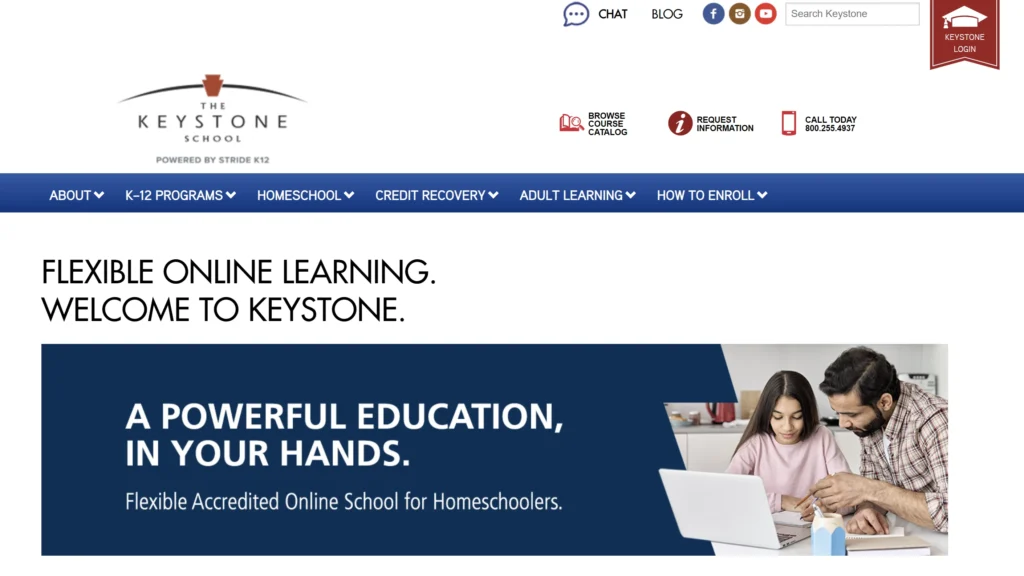
Photo credit: keysoneschoolonline.com
The Keystone School is like a choose-your-own-adventure novel for high school. It’s a private virtual school that’s all about flexibility and letting students learn at their own pace. Whether your teen wants to graduate early, catch up on credits, or focus on specific subjects, Keystone can make it happen.
What Makes The Keystone School Unique
- Self-Paced Learning: Keystone is all about letting your teen set the pace. They can speed through subjects they get easily and take more time on the ones they find challenging.
- Wide Range of Courses: They offer over 170 courses, including all the core subjects you’d expect, plus electives like forensic science, web design, and even zoology.
- Teacher Support: Students have access to licensed and certified teachers for support via email, phone, or an online system called Teacher Link.
- Accreditation: The Keystone School is regionally accredited, so your teen’s diploma is widely recognized and accepted by colleges and universities.
Keystone could be a good fit if:
- Your teen is self-motivated and independent: Keystone’s self-paced model works best for students who can manage their own time and stay on track.
- Your teen wants flexibility: Whether your teen has a busy schedule with sports or work, or they just prefer to learn at their own pace, Keystone offers the freedom they need.
- Your teen is looking for a college prep program: With college counseling and dual enrollment options, Keystone can help your teen prepare for the next step in their academic journey.
Considerations
- Cost: The Keystone School is a private school, so there are tuition fees. However, they do offer payment plans and financial aid options.
- Limited Social Interaction: Since it’s primarily self-paced, there might not be as many opportunities for social interaction as in some other online schools.
- Teacher Support Model: While teachers are available for support, it’s not the same as one-on-one tutoring. Students who require more individualized attention might need to supplement with additional tutoring services.
Stanford Online High School: For Gifted Learners
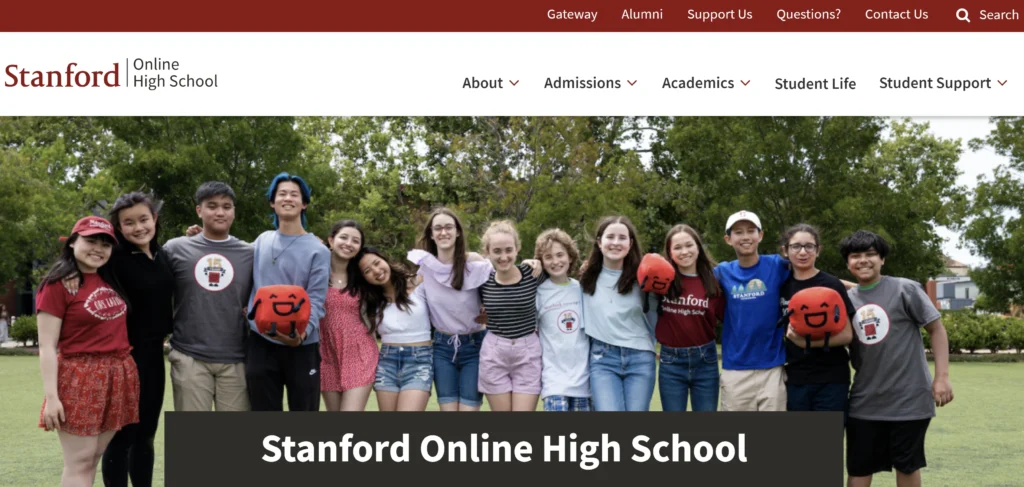
Photo credit: onlinehighschool.stanford.edu
Stanford Online High School (OHS) is a highly selective virtual school with programs for gifted students in grades 7-12. It provides a challenging, college-preparatory curriculum that goes beyond traditional coursework.
What Makes Stanford OHS Unique
- Rigorous Academics: Stanford OHS offers a challenging curriculum with advanced courses and seminars, taught by expert instructors from Stanford University and other institutions.
- Middle School Program (Grades 7-8): This program is specifically designed for younger gifted learners, focusing on foundational skills like critical thinking, analytical reasoning, and communication. While the curriculum is rigorous, it is developmentally appropriate for middle schoolers, preparing them for the advanced coursework in high school.
- Live, Interactive Classes: Students participate in real-time, seminar-style classes where they engage in discussions, debates, and collaborative projects with their peers.
- Individualized Student Support: Stanford OHS provides personalized support for every student, including academic advising, college counseling, and wellness resources. This ensures that students receive the guidance and resources they need to thrive both academically and personally.
- Supportive Community: Stanford OHS fosters a strong sense of community among its students, with opportunities for extracurricular activities, clubs, and social events. They even have an in-person summer program.
- College Prep Focus: The school has a strong emphasis on college preparation, with dedicated college counselors and resources to help students navigate the application process.
- Selective Admissions: Stanford OHS has a competitive admissions process and is designed for gifted and high-achieving students who are ready for an accelerated learning experience.
Stanford OHS could be a great option if:
- Your child is gifted or academically advanced: The school’s rigorous curriculum and challenging coursework are designed to push students to their full potential.
- Your child enjoys intellectual stimulation: Stanford OHS fosters a love of learning and encourages students to think critically and engage in deep discussions.
- Your child is looking for a supportive community: The school’s strong community provides a safe and welcoming space for gifted students to connect with their peers.
Considerations
- Cost: Stanford OHS is a private school with high tuition fees.
- Selective Admissions: Admission to the school is competitive, and students must meet certain academic requirements.
- Fast Pace: The coursework can be fast-paced and demanding, so students need to be self-motivated and able to keep up with the workload.
Outschool
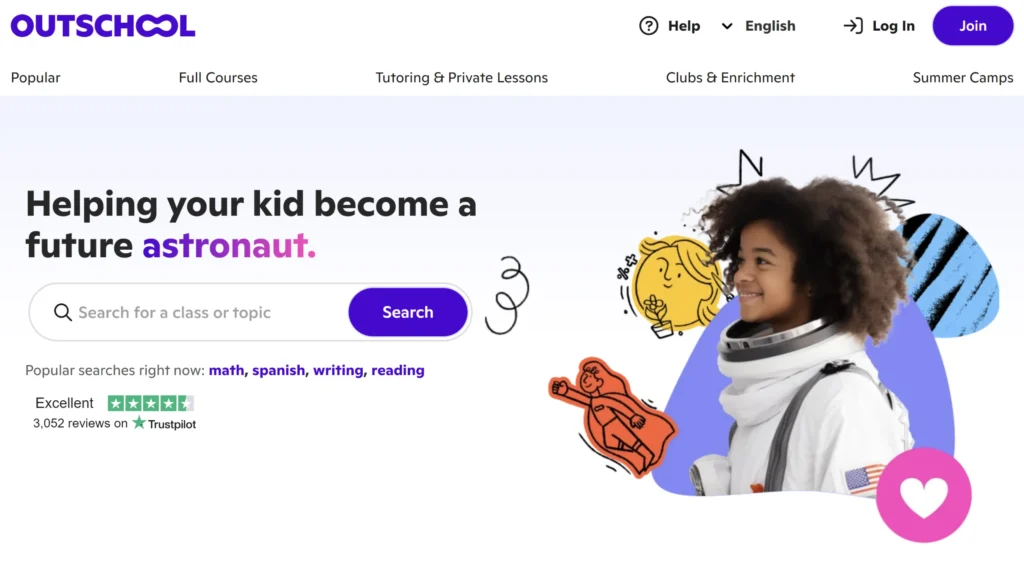
Photo credit: outschool.com
Outschool goes beyond the traditional classroom. This platform offers a diverse range of live, interactive classes on everything from core subjects to unique hobbies. With flexible scheduling and classes for all ages (3-18), Outschool is a great option for curious learners and those seeking a personalized learning experience. It provides a unique and engaging educational experience for children of all abilities, including those with dyslexia, ADHD, and other learning differences.
Key Features
- Diverse Learning Approaches: Outschool classes embrace various teaching methods, including project-based learning, hands-on activities, gamification, and more, ensuring that children with different learning styles can find classes that resonate with them.
- Live Classes & Clubs: Most Outschool classes are live, allowing for real-time interaction between students and teachers. They also offer clubs that meet regularly, fostering community and providing ongoing opportunities for learning and socialization.
- Small Class Sizes & Personalized Attention: Class sizes are typically capped, ensuring personalized attention from the teacher. This is especially beneficial for children who may need additional guidance or accommodations.
- Independent & Passionate Educators: Teachers on Outschool are vetted experts in their fields, bringing unique perspectives and enthusiasm to their classes. They often specialize in specific subjects or teaching methods, catering to diverse student interests and needs.
- Flexible Scheduling: Classes are offered at various times, making scheduling flexible for busy families.
- Community Engagement: Outschool fosters a sense of community through their online platform, where parents can connect with each other, share experiences, ask questions, and find support. Learner-led community classes and groups also provide a safe space for students to socialize and collaborate.
- Grade Levels & Subject Variety: Outschool offers classes for Pre-K through 12th grade, covering a wide range of subjects and interests, from core academics to niche hobbies.
- Tutoring & Private Lessons: In addition to group classes and clubs, Outschool also offers the option for one-on-one tutoring and private lessons for a highly personalized learning experience.
- Pricing & Refund Policy: Most classes fall between $10-$30 per session, with occasional discounts and promotions. A flexible refund policy allows for full refunds if cancellations are made at least 24 hours before the class starts.
Considerations
- Cost: While many classes are affordable, costs can add up if your child takes multiple classes or opts for tutoring.
- Independent Nature: Outschool might not be the best fit for students who need a highly structured learning environment with constant teacher oversight.
Overall, Outschool offers a vibrant and enriching online learning experience that caters to a diverse range of students and learning styles. It’s a fantastic option for families who value flexibility, personalized instruction, and a wealth of educational opportunities.
Time4Learning
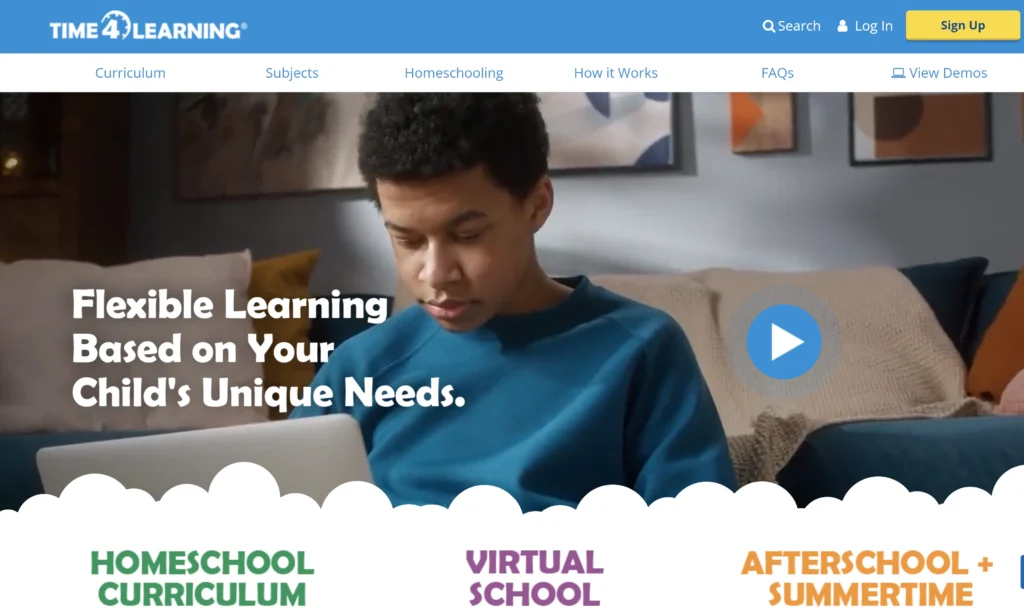
Photo credit: time4learning.com
Time4Learning is a popular choice for homeschooling families due to its comprehensive curriculum and self-paced format. This platform provides a comprehensive curriculum for PreK-12th grade, covering all core subjects (math, language arts, science, social studies) and some electives. Students can learn at their own pace with interactive lessons, automated grading, and detailed progress reports. This platform is designed to be used as a primary homeschool curriculum, after-school enrichment, or a summer learning program.
Key Features
- Comprehensive Curriculum: Time4Learning covers all core subjects with a standards-based curriculum that aligns with most state requirements.
- Interactive Lessons: Lessons include multimedia activities, animated lessons, and interactive games to keep students engaged.
- Automated Grading and Reporting: The platform automatically grades assignments and provides detailed reports on student progress, making it easy for parents to track their child’s learning.
- Flexible Pacing: Students can work at their own pace, moving ahead or reviewing material as needed.
- Offline Activities: In addition to online lessons, Time4Learning provides printable worksheets and activity ideas for offline learning.
- Parent Dashboard: Parents have access to a dashboard where they can monitor their child’s progress, adjust lesson plans, and communicate with teachers.
- Affordable Pricing: Time4Learning offers a monthly subscription model with different pricing options depending on the grade level and number of subjects. The platform also provides a 14-day money-back guarantee, allowing families to try it out risk-free.
Considerations
- Limited Social Interaction: Time4Learning lacks the live interaction and social component found in platforms like Outschool.
- Independent Learning Style: It may not be the best fit for students who thrive in a more traditional classroom setting with teacher-led instruction.
- Non-Accredited: While widely accepted by homeschooling organizations and many school districts, Time4Learning is not accredited. Parents should check with their local school district to ensure that it meets their specific homeschooling requirements.
Positive Reviews and Differentiated Instruction
Time4Learning has received positive reviews from many homeschooling families for its ease of use, comprehensive curriculum, and affordability. The platform also caters to a wide range of learners, including gifted students and those with learning differences, by offering differentiated instruction and allowing students to repeat lessons if needed.
Power Homeschool
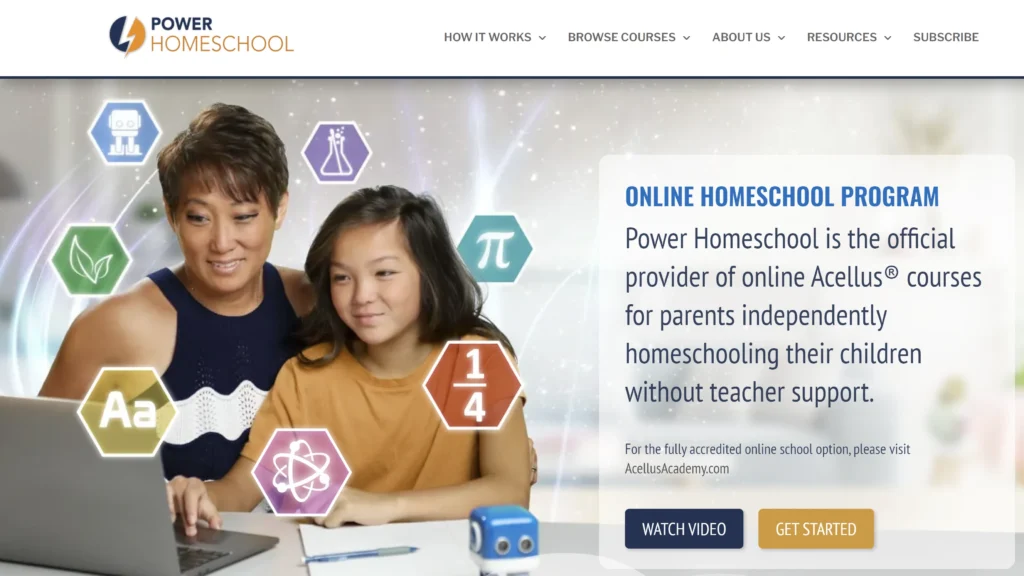
Photo credit: powerhomeschool.org
If you’re a parent who wants to be actively involved in your child’s education, Power Homeschool puts you in the driver’s seat. This online program gives you a full curriculum for grades PreK-12. It’s designed for independent learners who thrive with a flexible, self-paced curriculum. Using the Acellus learning system, your child will dive into video lessons, interactive activities, and quizzes covering all the core subjects and a variety of electives. Think of it as a personalized learning adventure where your child sets the pace, and you’re the co-pilot.
What Makes Power Homeschool Unique
- Self-Paced Learning: No rigid schedules here! Your child can breeze through subjects they understand and take more time on the ones they find tricky. It’s all about learning at a pace that works for them.
- Parent-Guided: You’re not just a bystander; you’re the coach! You’ll help your child navigate the lessons, check their work, and cheer them on as they learn.
- Affordable Option: Power Homeschool is one of the more budget-friendly options out there.
- Wide Range of Courses: They offer courses for all core subjects and some electives, covering everything from math and science to coding and art.
Considerations
- No Live Teachers: Power Homeschool uses video lessons and interactive activities, so there’s no live teacher interaction.
- Self-Discipline Required: This program requires students to be self-disciplined and able to manage their own time effectively.
- Not Accredited: Power Homeschool is not accredited, so you’ll need to check with your local school district to see if the credits will be accepted.
Power Homeschool’s platform is easy to use, and they offer tech support if you have any questions.
Best Supplemental Programs & Resources
Study.com
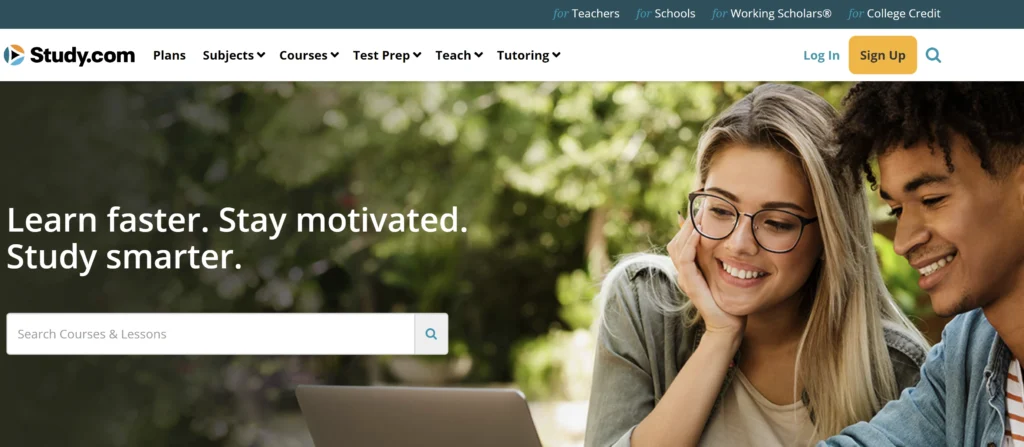
Photo credit: study.com
Think of Study.com as a massive online library of bite-sized lessons. It offers thousands of video lessons and quizzes on all kinds of subjects, from middle-school math to college-level physics. It’s great for brushing up on specific topics or getting ahead in a subject. It’s a versatile resource for homeschooling, test prep (SAT, ACT), or simply expanding knowledge on specific topics. With its self-paced learning and progress-tracking features, Study.com can be tailored to individual needs and learning styles. Study.com offers various subscription options to fit different budgets.
Khan Academy
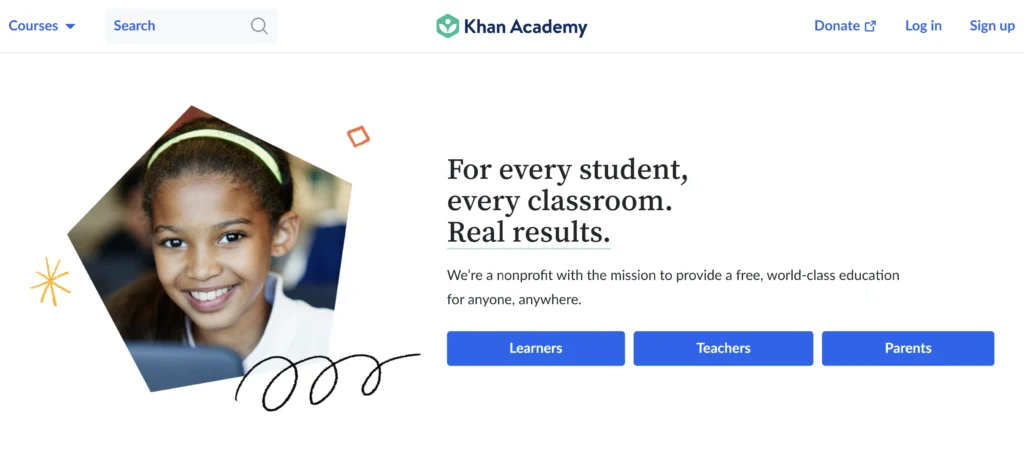
Photo credit: khanacademy.org
This non-profit organization provides a completely free platform with thousands of instructional videos, practice exercises, and personalized learning dashboards covering math, science, humanities, coding, and more. It’s suitable for learners of all ages, from elementary through high school and even beyond. While it lacks live interaction, Khan Academy’s comprehensive content and adaptive learning features make it a valuable resource for supplementing classroom learning or homeschooling.
BrainPOP
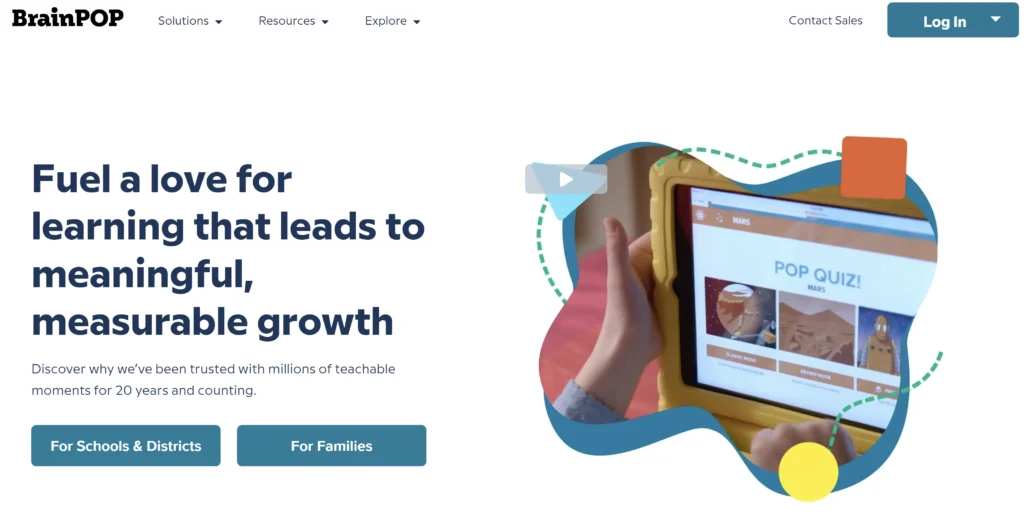
Photo credit: brainpop.com
This animated educational platform makes learning fun with short videos, quizzes, and activities covering science, social studies, English, math, engineering & technology, health, and arts & music. It’s particularly popular for elementary and middle school students but also offers resources for high schoolers. While not a full curriculum provider, BrainPOP’s engaging content can supplement classroom learning or spark curiosity in various subjects. Subscription-based, with options for schools and families.
If you’re looking for additional ways to make learning fun and engaging for your child, check out our article on “Fun Educational Games for Kids on Android“.
CK-12 Foundation
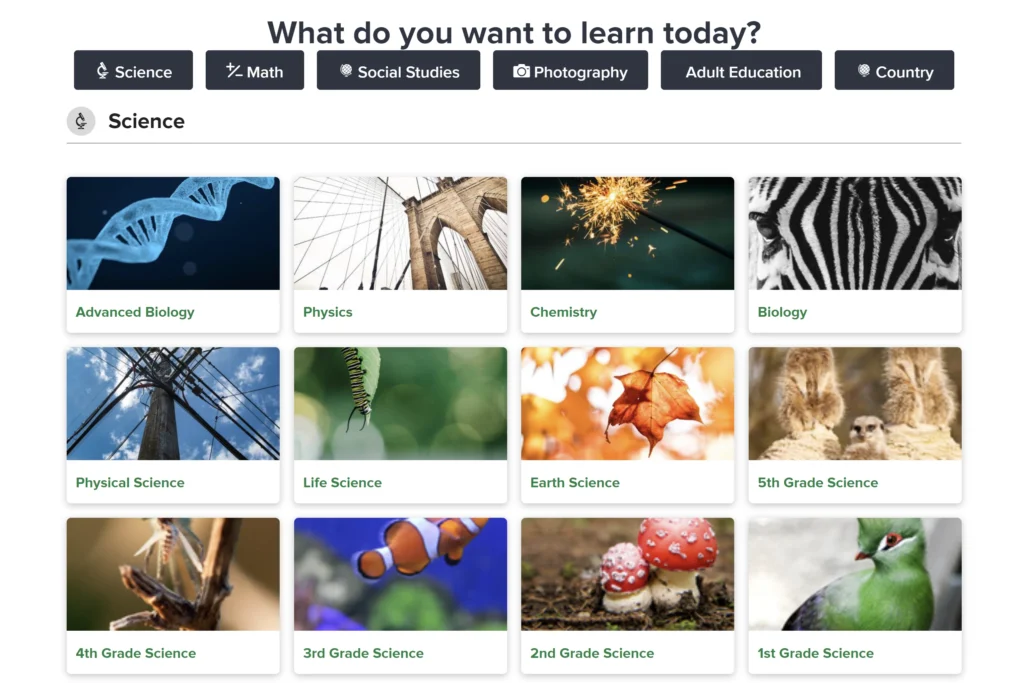
Photo credit: ck12.org
This non-profit organization offers free, high-quality, customizable STEM resources (Science, Technology, Engineering, and Math) for K-12 students and teachers. They provide digital textbooks, interactive simulations, adaptive practice, and personalized learning paths. CK-12 is an excellent resource for homeschoolers and virtual schools looking for flexible, engaging, and affordable STEM materials.
Varsity Tutors
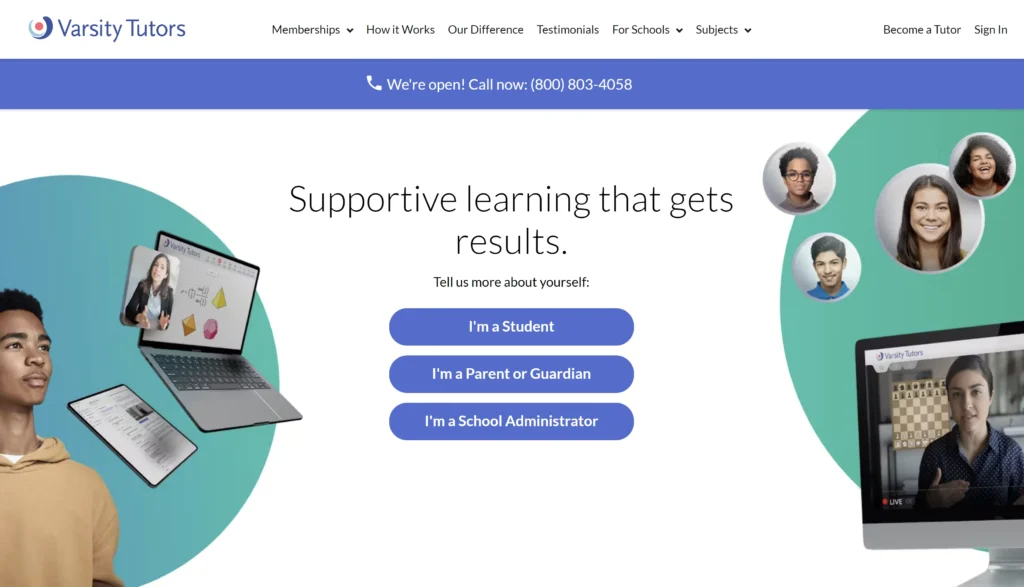
Photo credit: varsitytutors.com
This platform connects students with expert tutors for one-on-one or small-group online tutoring sessions. They offer personalized tutoring for a wide range of K-12 subjects, standardized test preparation (SAT, ACT, etc.), and even academic coaching. While tutoring can be costly, Varsity Tutors offers various pricing options and packages to suit different budgets. Varsity Tutors can be a valuable resource for students in virtual schools who need additional support or want to excel in specific subjects.
Tips for a Successful Online Learning Experience

Online learning can be awesome, but it’s a bit different from a traditional classroom. Here are some tried-and-true tips to help your child rock their online learning adventure:
- Create a Learning Zone: Find a quiet spot in your home where your child can focus without distractions. It could be a desk in their room, a corner of the living room, or even a comfy spot on the couch. Bonus points for good lighting and a comfy chair!
- Stick to a Schedule: Just like school, having a routine helps kids stay on track. Set regular times for waking up, studying, breaks, meals, and even virtual recess.
- Tech Check: Make sure you and your child know how to use the online learning platform. Practice logging in, accessing lessons, and submitting assignments before school starts. If you run into trouble, don’t be afraid to ask for help from tech support!
- Get Involved: Online learning doesn’t mean your child is alone. Encourage them to participate in live classes, join online discussions, and work on group projects with other students.
- Set Goals and Track Progress: Help your child set realistic goals for their learning. Maybe they want to ace their next math quiz or finish a book report by Friday. Tracking their progress can help them stay motivated and see how far they’ve come.
- Take Breaks: Even superheroes need to recharge! Encourage your child to take short breaks to stretch, move around, grab a snack, or just relax. This will help them stay focused and avoid burnout.
- Stay Organized: Keep track of assignments, due dates, and important information. Use a calendar, planner, or even a whiteboard to help your child stay on top of things.
- Talk to the Teacher: Teachers are your allies! If your child is struggling, has questions, or just needs a little extra help, don’t hesitate to reach out to their teacher.
- Mix It Up: Online learning doesn’t have to be all screen time. Encourage your child to use other resources like books, educational apps, or hands-on activities to make learning even more fun.
- Celebrate Wins: Learning should be fun! Celebrate your child’s successes, big or small. Give them high-fives, praise, or even a special treat to show them how proud you are of their hard work.
Remember, every child is different, and what works for one might not work for another. Be patient, flexible, and willing to adjust your approach as you figure out what helps your child learn best. With a little effort and these tips, online learning can be an amazing experience for your whole family.
Your Child’s Learning Journey, Reimagined
Choosing the right online learning platform for K-12 is like finding the perfect pair of shoes for your kid – it needs to fit their unique needs and style. With so many options out there, it can feel overwhelming, but don’t worry, we’ve got your back.
We’ve explored some of the top online learning platforms for K-12 in the U.S., from public schools like K12 and Connections Academy to flexible providers like Keystone and Outschool and even supplemental resources like Khan Academy and Study.com. Each platform has its own strengths and specialties, so take the time to explore and see which one feels right for your family.
Remember, the best online learning platform is the one that empowers your child to learn, grow, and thrive. It’s about finding the right fit for their learning style, interests, and goals. And with so many amazing options available, there’s sure to be an online learning platform out there that’s perfect for your child.
Explore the world of online learning platforms for K-12 and discover a new way for your child to reach their full potential. It might just be the best decision you ever make for their education!
FAQs
Is online learning as effective as traditional schooling?
Studies have shown that online learning can lead to similar or better academic outcomes compared to traditional schooling, especially when combined with strong parental involvement and a supportive learning environment.
Will my child miss out on social interaction with online learning?
Many online learning platforms for K-12 incorporate virtual classrooms, group projects, discussion forums, and even extracurricular activities to encourage social connections among students. Plus, parents can supplement online learning with in-person activities like sports, clubs, or community events.
How do I know if my child is ready for online learning?
There are some key indicators that your child might be ready for online learning. These include being self-motivated, having good time management skills, being comfortable with technology, and enjoying independent learning. If your child is younger, you’ll likely need to be more involved in their learning and provide additional support.
What happens if my child falls behind in online learning?
Most online learning platforms offer various support mechanisms to help struggling students. These can include tutoring, additional resources, and individualized instruction. If your child is falling behind, don’t hesitate to reach out to their teacher or the platform’s support team for help.
How much screen time is appropriate for online learning?
Many online learning platforms for K-12 incorporate offline activities and hands-on projects to balance screen time. It’s also crucial to encourage other forms of play and social interaction outside of online learning.
What are the long-term benefits of online learning for my child?
Online learning can equip your child with valuable future skills, such as self-discipline, time management, digital literacy, and independent problem-solving. These skills can be beneficial for college and future careers in an increasingly digital world.
How can I ensure my child stays motivated and engaged in online learning?
Create a positive and supportive learning environment. Set clear expectations, celebrate their achievements, and offer encouragement when they face challenges. Incorporate variety into their learning by using supplemental resources, encouraging hands-on activities, and finding ways to connect their learning to real-world experiences.





